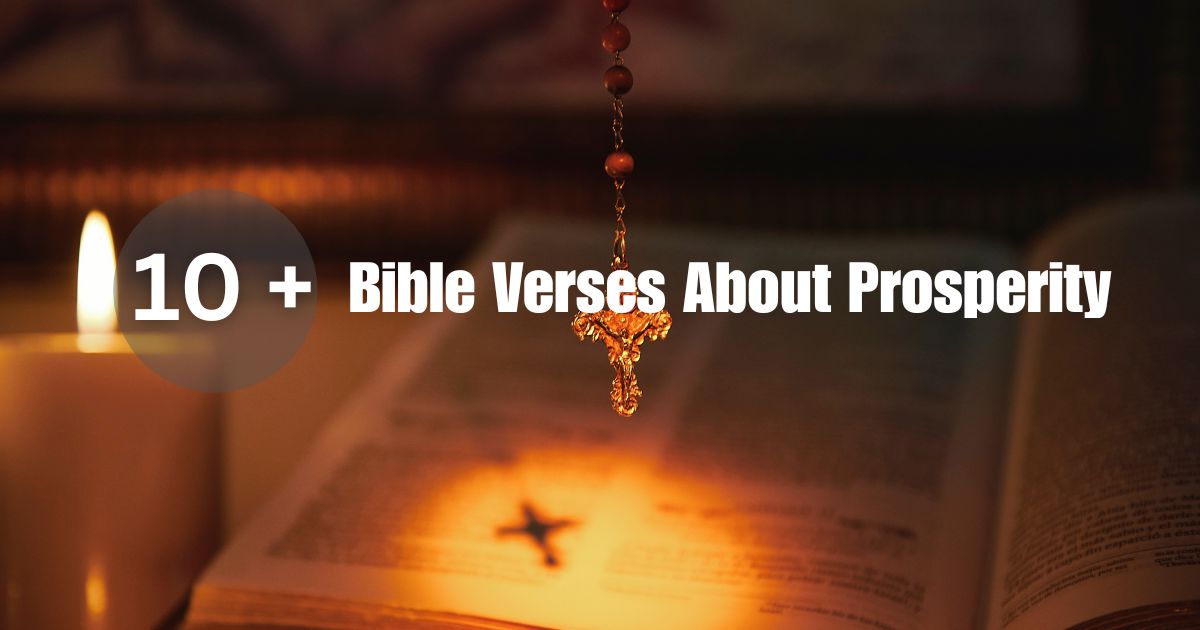The desire for prosperity is a universal human experience. We long for financial security, healthy families, fulfilling work, and a general sense of well-being and peace. In our search for this “good life,” it’s only natural to turn to our faith for guidance. What does the Bible say about prosperity?
The answer is richer and more nuanced than a simple promise of wealth. The Bible is filled with verses that speak of God’s abundant blessings, but it also contains serious warnings about the dangers of wealth and the pitfalls of seeking it above all else. This isn’t a contradiction; it’s a complete picture.
This article will guide you through the profound biblical perspective on prosperity. We will move beyond a simple list to explore the deep meaning of key scriptures, their historical context, and most importantly, how you can apply these eternal principles to your modern life. Our goal is not just to inform you but to equip you with a balanced, faithful understanding of what it means to truly prosper.
What Does the Bible Really Mean by “Prosperity”?
Before we dive into specific verses, we must define our terms. The world often defines prosperity in purely material terms: a high income, a large house, and financial independence. While the Bible doesn’t exclude material blessings, its concept of prosperity is far more holistic.
The Hebrew word often translated as “prosper” or “peace” is Shalom. Shalom means more than just the absence of conflict; it signifies completeness, wholeness, welfare, and harmony in all areas of life with God, with others, and with creation.
This is perfectly captured in 3 John 1:2:
“Beloved, I pray that you may prosper in all things and be in health, just as your soul prospers.”
Here, the apostle John connects prosperity directly to physical health and the health of one’s soul. True biblical prosperity is the flourishing of every part of your life under the benevolent care of God. It starts with your soul (your relationship with God) and overflows into your physical circumstances, relationships, and work. With this foundational understanding, let’s explore the key verses.
Top Bible Verses About Prosperity: Meaning and Commentary
We will explore the most cited verses, not with a brief gloss, but with the depth needed to truly understand and believe them.
1. Jeremiah 29:11
“For I know the plans I have for you,” declares the Lord, “plans to prosper you and not to harm you, plans to give you hope and a future.” (NIV)
- Context: This is one of the most popular but often misapplied verses. God spoke these words through the prophet Jeremiah to the Israelites who had been conquered and exiled to Babylon. They were defeated, homeless, and despairing.
- Meaning: This was not a promise of immediate deliverance or personal wealth. It was a promise of God’s ultimate goodness in the midst of suffering. He had a long-term plan for their restoration (70 years in the future) and called them to seek the peace of the city they were exiled in (Jer 29:7). The “prosperity” and “future” were tied to their identity as God’s people in a foreign land.
- Application for Today: You can claim this promise not as a guarantee of a easy life, but as a assurance that God has a purpose for your life, even in difficult seasons. His plans are for your ultimate good and His glory, which may unfold over a lifetime, not just a moment.
2. Joshua 1:8
“Keep this Book of the Law always on your lips; meditate on it day and night, so that you may be careful to do everything written in it. Then you will be prosperous and successful.” (NIV)
- Context: God spoke this to Joshua as he was about to lead the Israelites into the Promised Land—a daunting task filled with warfare and uncertainty.
- Meaning: Prosperity and success here are directly linked to obedience to God’s Word. The formula is simple: internalize Scripture (“meditate on it”), which leads to obedience (“do everything written in it”), which results in prosperity. The success was specifically about claiming the land God had promised.
- Application for Today: Your journey toward prosperity begins with filling your mind with God’s wisdom. As you align your decisions, business practices, and financial habits with biblical principles, you position yourself for the success God intends.
3. Deuteronomy 8:18
“But remember the Lord your God, for it is he who gives you the ability to produce wealth, and so confirms his covenant, which he swore to your ancestors, as it is today.” (NIV)
- Context: Moses said this to the Israelites before they entered Canaan, a land of great wealth, to warn them against pride.
- Meaning: This verse is a crucial corrective to self-made wealth ideology. It reminds us that every skill, talent, and opportunity we have to create wealth is a gift from God. Our ability to think, work, and innovate originates with Him. The purpose of this wealth is to confirm His covenant faithfulness.
- Application for Today: Practice gratitude. Acknowledge that your job, your intelligence, and your opportunities are gifts from God. This mindset transforms how you view money—from a possession to hoard to a tool for stewardship, to be used for His purposes.
4. Malachi 3:10
“Bring the whole tithe into the storehouse, that there may be food in my house. Test me in this,” says the Lord Almighty, “and see if I will not throw open the floodgates of heaven and pour out so much blessing that there will not be room enough to store it.” (NIV)
- Context: The people were neglecting their tithes (giving 10% of their income), and God challenged them to return to this practice of trust.
- Meaning: This is the only place in the Bible where God says “test me.” It highlights the link between obedient generosity and divine blessing. The blessing was likely agricultural in nature (“open the windows of heaven” for rain), but the principle of God honoring faithful giving remains.
- Application for Today: Embrace generosity as a spiritual discipline. Start with tithing as a baseline of giving. View it as an act of worship and trust that God will provide for your needs. The “blessing” may not always be financial; it could be peace, creativity, or unexpected provision.
Find Out More : Bible Verses About Lying: What Scripture Says & How to Stop
5. Psalm 1:1-3
“Blessed is the one who does not walk in step with the wicked or stand in the way that sinners take or sit in the company of mockers, but whose delight is in the law of the Lord, and who meditates on his law day and night. That person is like a tree planted by streams of water, which yields its fruit in season and whose leaf does not wither— whatever they do prospers.” (NIV)
- Context: This wisdom Psalm sets up a contrast between two ways of life: the way of the righteous and the way of the wicked.
- Meaning: Prosperity here is depicted as a natural outcome of a righteous life. The person connected to God’s Word is like a healthy, well-rooted tree. They are stable, fruitful, and resilient. “Whatever they do prospers” means their endeavors are blessed because they are aligned with God’s ways.
- Application for Today: Focus on your spiritual roots. Your external prosperity is often a reflection of your internal health. Cultivate a life that delights in God’s ways, and you will build a foundation for lasting success that can weather any storm.
6. Proverbs 3:9-10
“Honor the Lord with your wealth, with the firstfruits of all your crops; then your barns will be filled to overflowing, and your vats will brim over with new wine.” (NIV)
- Context: This is from King Solomon’s collection of wisdom sayings, instructing his son on how to live a godly life.
- Meaning: The principle of “firstfruits” is about priority and trust. It means giving God the first and best portion of your income, not what is left over. This act of “honoring” God financially demonstrates that He is first in your life. The promised result is abundant provision.
- Application for Today: Before you pay any other bill or expense, set aside your tithe and offering. This practical act disciplines your heart to trust God as your provider. View your budget through the lens of honoring God first, and watch how He manages the rest.
7. 2 Corinthians 9:6-8
“Remember this: Whoever sows sparingly will also reap sparingly, and whoever sows generously will also reap generously. Each of you should give what you have decided in your heart to give, not reluctantly or under compulsion, for God loves a cheerful giver. And God is able to bless you abundantly, so that in all things at all times, having all that you need, you will abound in every good work.” (NIV)
- Context: The Apostle Paul was collecting an offering for impoverished believers in Jerusalem. He encourages the Corinthian church to be generous.
- Meaning: This passage uses an agricultural metaphor: generosity is like planting seed. A small, grudging gift is like planting few seeds—you’ll get a small harvest. A generous, cheerful gift is like planting a full field. The purpose of the abundance is clear: not for lavish living, but to “abound in every good work.”
- Application for Today: Approach giving with a strategic, joyful heart. Don’t give because you have to, but because you get to partner with God in His work. Expect that God will provide for your needs and give you even more resources to be a blessing to others.
8. Deuteronomy 28:1-2, 12-13
“If you fully obey the Lord your God and carefully follow all his commands I give you today… all these blessings will come on you and accompany you… The Lord will open the heavens, the storehouse of his bounty, to send rain on your land in season and to bless all the work of your hands. You will lend to many nations but will borrow from none. The Lord will make you the head, not the tail. If you pay attention to the commands of the Lord your God and follow them, you will always be at the top, never at the bottom.” (NIV)
- Context: This is part of Moses’ lengthy sermon outlining the blessings of covenant obedience and the curses of disobedience before Israel enters the Promised Land.
- Meaning: This is the most comprehensive list of blessings in the Bible. It covers agricultural success, victory over enemies, and financial leadership (“the head, not the tail”). The blessings are conditional and corporate, promised to the nation for collective obedience to the covenant law.
- Application for Today: While we are under a new covenant in Christ, the principle remains: obedience to God’s ways brings blessing. Apply this by seeking God’s principles for business, finance, and relationships. strive to be in a position to lend and give (the head), rather than always being in need and borrowing (the tail).
9. Philippians 4:19
“And my God will meet all your needs according to the riches of his glory in Christ Jesus.” (NIV)
- Context: Paul writes this to the Philippian church who had generously supported him financially during his ministry, even when they themselves were poor.
- Meaning: This is not a blank check. The promise is made to generous givers. Paul says, “Because you have met my need, God will meet yours.” The measure of God’s provision is astonishing: “according to the riches of his glory,” not out of them. It’s an infinite source.
- Application for Today: If you are a generous person, you can have absolute confidence that God will provide for your every need. It may not be your every want, but He will ensure you have what you need to serve Him effectively. This verse is a anchor of security for those who give.
10. Psalm 35:27
“May those who delight in my vindication shout for joy and gladness; may they always say, ‘The Lord be exalted, who delights in the well-being of his servant.'” (NIV)
- Context: A Psalm of David, written while he was being pursued by enemies who falsely accused him. He cries out for God’s justice.
- Meaning: The Hebrew word for “well-being” here is shalom. David declares that God delights in the shalom—the holistic prosperity—of His faithful servants. Even in deep trouble, David affirms that God’s heart is for his complete well-being.
- Application for Today: Internalize this truth: God is not reluctant or stingy; He delights in your prosperity. When you are facing a challenge, remember that God is on your side, working for your wholeness and vindication. Your success brings Him joy.
11. Proverbs 13:22
“A good person leaves an inheritance for their children’s children, but a sinner’s wealth is stored up for the righteous.” (NIV)
- Context: A wisdom proverb contrasting the long-term outcomes of the righteous and the wicked.
- Meaning: This verse emphasizes multi-generational blessing. Biblical prosperity isn’t just for personal consumption; it’s meant to be stewarded and built upon to bless future generations. It also hints at a divine justice where wealth that is hoarded or gained unjustly eventually finds its way to those who will use it rightly.
- Application for Today: Think beyond your own lifetime. Make financial decisions with your children and grandchildren in mind. This includes not just monetary inheritance but also a legacy of faith, wisdom, and financial discipline.
12. Luke 6:38
“Give, and it will be given to you. A good measure, pressed down, shaken together and running over, will be poured into your lap. For with the measure you use, it will be measured to you.” (NIV)
- Context: Part of Jesus’ Sermon on the Plain, where He teaches about the economy of the Kingdom of God, which often reverses worldly wisdom.
- Meaning: This is a spiritual law. The principle of receiving is giving. The imagery is of a grain measure being packed down and shaken to fit as much as possible, then overflowing. It signifies abundant, generous repayment. The “lap” refers to the fold of a robe used as a pouch, implying a large quantity.
- Application for Today: Be proactive in giving—your money, time, forgiveness, and encouragement. The return you receive may not always be in the same currency (e.g., giving money may result in returned peace or relationships), but it will be a generous return from God.
13. 1 Chronicles 29:12
“Wealth and honor come from you; you are the ruler of all things. In your hands are strength and power to exalt and give strength to all.” (NIV)
- Context: King David’s prayer of praise after the people gave generously for the construction of the Temple.
- Meaning: This is a powerful declaration of God’s sovereignty over all resources. David acknowledges that every form of prosperity (“wealth and honor”) ultimately originates from God. He is the source and distributor.
- Application for Today: This verse is a powerful antidote to pride. Whenever you experience success, recite this prayer. It cultivates a heart of humility and gratitude, recognizing that you are a steward of what God has chosen to place in your hands.
14. Proverbs 22:4
“Humility is the fear of the Lord; its wages are riches and honor and life.” (NIV)
- Context: A wisdom proverb linking character to consequence.
- Meaning: This verse defines humility as a reverence for God that results in putting Him first. The result of this posture is a package deal: “riches and honor and life.” This is holistic prosperity—financial provision, a good reputation, and a full, abundant life.
- Application for Today: Pursue God, not prosperity. Cultivate a humble heart that fears the Lord. The blessings of riches and honor will follow as a natural byproduct of aligning your life with Him. Don’t seek the gifts; seek the Giver.
15. Isaiah 48:17
“This is what the Lord says— your Redeemer, the Holy One of Israel: ‘I am the Lord your God, who teaches you what is best for you, who directs you in the way you should go.'” (NIV)
- Context: God speaks to a stubborn and rebellious Israel, reminding them of His faithful character despite their disobedience.
- Meaning: True prosperity is found in following God’s instructions. He, as our Creator and Redeemer, knows what is “best” for us. His commands are not restrictive, but a roadmap to the best possible life.
- Application for Today: When facing financial or professional decisions, seek God’s wisdom first. Trust that His guidance, found in Scripture and through prayer, will lead you down the path that is truly best for you, even if it seems counterintuitive to the world’s logic.
The Necessary Balance: Bible Verses That Warn About Wealth
A truly biblical view of prosperity must acknowledge the warnings. Ignoring these creates a distorted “prosperity gospel.”
- 1 Timothy 6:10:“For the love of money is a root of all kinds of evil. Some people, eager for money, have wandered from the faith and pierced themselves with many griefs.”
- The Warning: It’s not money itself, but the love of money—making it an idol—that leads to ruin. Prosperity is dangerous if it shifts your trust from God to your bank account.
- Matthew 6:24:“No one can serve two masters. Either you will hate the one and love the other, or you will be devoted to the one and despise the other. You cannot serve both God and money.”
- The Warning: This verse establishes a fundamental conflict of allegiance. Biblical prosperity always keeps God as the Master; money is merely a tool.
- Proverbs 30:8-9:“…give me neither poverty nor riches, but give me only my daily bread. Otherwise, I may have too much and disown you and say, ‘Who is the Lord?’ Or I may become poor and steal, and so dishonor the name of my God.”
- The Warning: This is a prayer for contentment. The author recognizes the spiritual dangers of both extreme poverty and extreme wealth. The goal is a trusting dependence on God.
5 Principles for Biblical Prosperity
Synthesizing these verses, we can derive core principles for pursuing prosperity God’s way.
- Principle of Obedience: Prosperity is a byproduct of a life aligned with God’s commands (Joshua 1:8, Deut. 28).
- Principle of Source: God is the ultimate source of our ability to create wealth; we are managers, not owners (Deut. 8:18).
- Principle of Generosity: Giving is the mechanism that keeps blessings flowing and breaks the power of greed (Luke 6:38, 2 Cor. 9:6-7).
- Principle of Diligence: God blesses faithful work and wisdom (Proverbs 10:4, 13:11, 22:29).
- Principle of Soul Health: True prosperity is holistic; your spiritual health is the foundation for all other blessing (3 John 1:2, Psalm 1:1-3).
Frequently Asked Questions
Is the “prosperity gospel” biblical?
The popular “prosperity gospel” that teaches God always wants you healthy and wealthy in exchange for faith and donations is a distortion. It often ignores the Bible’s teachings on suffering, the cross, and the warnings about wealth. Biblical prosperity is God-centric, not self-centric, and values spiritual health above material gain.
Does God want everyone to be rich?
God’s will is for everyone to be conformed to the image of Christ (Romans 8:29), which can happen in both poverty and wealth. His primary concern is our character and our trust in Him. For some, that journey involves wealth as a tool for kingdom work; for others, it involves learning contentment in need (Philippians 4:12).
Why do some faithful Christians struggle financially?
This is a complex question with many answers: living in a fallen world, systemic injustice, personal choices, or sometimes, for reasons known only to God. Financial struggle is not necessarily a sign of a lack of faith. God’s promise is His presence and ultimate provision (Philippians 4:19), not necessarily a life of luxury.
How can I practice generosity when I have little?
Biblical generosity is about the heart, not the amount. The widow’s mite (Mark 12:41-44) is the classic example. Start where you are. Giving a small amount faithfully cultivates a heart of trust and breaks the spirit of scarcity. You can also be generous with your time, talents, and encouragement.
Read More : 50 Powerful Bible Verses About Strength
Conclusion
Biblical prosperity is a beautiful, multi-faceted promise from a good Father. It is not a guarantee of a problem-free life but an invitation to a life of trust, obedience, and generosity, resulting in holistic well-being—spirit, soul, and body. As we have seen through these verses, God’s heart is for you to flourish in every area, using His blessings to advance His kingdom and serve others. True prosperity begins when we seek His presence above His presents, aligning our desires with His eternal purposes.
Let’s pray together:
Heavenly Father, thank you for your good plans for my life. Help me to seek first your kingdom and your righteousness, trusting that all these things will be added unto me. Give me the wisdom to understand your Word, the courage to obey it, and a generous heart that reflects your own. Whether in lack or in plenty, let my soul prosper in my relationship with you. I acknowledge you as the source of every good gift. In Jesus’ name, Amen.

I’m Roman, the author of starspotlights.com. I collect clear Bible verses and give short, easy explanations. My goal is to make Scripture simple for everyone — beginners, busy people, and anyone who wants to learn.










